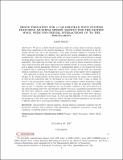| dc.contributor.author | Speck, Jared R. | |
| dc.date.accessioned | 2018-07-19T17:03:05Z | |
| dc.date.available | 2018-10-07T05:00:05Z | |
| dc.date.issued | 2017-12 | |
| dc.identifier.issn | 2524-5317 | |
| dc.identifier.issn | 2199-2576 | |
| dc.identifier.uri | http://hdl.handle.net/1721.1/117006 | |
| dc.description.abstract | We prove a stable shock formation result for a large class of systems of quasilinear wave equations in two spatial dimensions. We give a precise description of the dynamics all the way up to the singularity. Our main theorem applies to systems of two wave equations featuring two distinct wave speeds and various quasilinear and semilinear nonlinearities, while the solutions under study are (non-symmetric) perturbations of simple outgoing plane symmetric waves. The two waves are allowed to interact all the way up to the singularity. Our approach is robust and could be used to prove shock formation results for other related systems with many unknowns and multiple speeds, in various solution regimes, and in higher spatial dimensions. However, a fundamental aspect of our framework is that it applies only to solutions in which the “fastest wave” forms a shock while the remaining solution variables do not, even though they can be non-zero at the fastest wave’s singularity. Our approach is based on an extended version of the geometric vectorfield method developed by D. Christodoulou in his study of shock formation for scalar wave equations, as well as the framework that we developed in our joint work with J. Luk, in which we proved a shock formation result for a quasilinear wave-transport system featuring a single wave operator. A key new difficulty that we encounter is that the geometric vectorfields that we use to commute the equations are, by necessity, adapted to the wave operator of the (shock-forming) fast wave and therefore exhibit very poor commutation properties with the slow wave operator, much worse than their commutation properties with a transport operator. In fact, commuting the vectorfields all the way through the slow wave operator would create uncontrollable error terms. To overcome this difficulty, we rely on a first-order reformulation of the slow wave equation, which, though somewhat limiting in the precision it affords, allows us to avoid uncontrollable commutator terms. Keywords: Characteristics, Eikonal equation, Eikonal function, Genuinely nonlinear strictly hyperbolic systems, Null condition, Null hypersurface, Singularity formation, Strong null condition, Vectorfield method, Wave breaking | en_US |
| dc.description.sponsorship | National Science Foundation (U.S.) (Grant DMS-1162211) | en_US |
| dc.description.sponsorship | National Science Foundation (U.S.) (CAREER Grant DMS-1454419) | en_US |
| dc.description.sponsorship | Alfred P. Sloan Foundation | en_US |
| dc.description.sponsorship | Solomon Buchsbaum AT&T Research Fund | en_US |
| dc.publisher | Springer International Publishing | en_US |
| dc.relation.isversionof | https://doi.org/10.1007/s40818-017-0042-8 | en_US |
| dc.rights | Creative Commons Attribution-Noncommercial-Share Alike | en_US |
| dc.rights.uri | http://creativecommons.org/licenses/by-nc-sa/4.0/ | en_US |
| dc.source | Springer International Publishing | en_US |
| dc.title | Shock Formation for 2D Quasilinear Wave Systems Featuring Multiple Speeds: Blowup for the Fastest Wave, with Non-trivial Interactions up to the Singularity | en_US |
| dc.type | Article | en_US |
| dc.identifier.citation | Speck, Jared. “Shock Formation for 2D Quasilinear Wave Systems Featuring Multiple Speeds: Blowup for the Fastest Wave, with Non-Trivial Interactions up to the Singularity.” Annals of PDE, vol. 4, no. 1, June 2018. | en_US |
| dc.contributor.department | Massachusetts Institute of Technology. Department of Mathematics | en_US |
| dc.contributor.mitauthor | Speck, Jared R. | |
| dc.relation.journal | Annals of PDE | en_US |
| dc.eprint.version | Author's final manuscript | en_US |
| dc.type.uri | http://purl.org/eprint/type/JournalArticle | en_US |
| eprint.status | http://purl.org/eprint/status/PeerReviewed | en_US |
| dc.date.updated | 2018-06-21T04:06:24Z | |
| dc.language.rfc3066 | en | |
| dc.rights.holder | Springer International Publishing AG, part of Springer Nature | |
| dspace.orderedauthors | Speck, Jared | en_US |
| dspace.embargo.terms | N | en |
| dc.identifier.orcid | https://orcid.org/0000-0001-5020-3568 | |
| mit.license | OPEN_ACCESS_POLICY | en_US |
